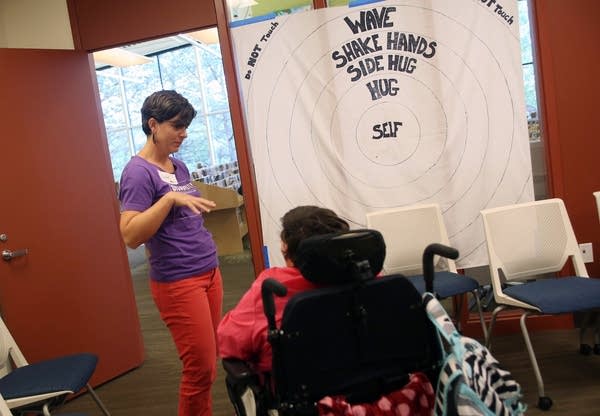Arts program helps women with disabilities navigate sex, relationships

Go Deeper.
Create an account or log in to save stories.
Like this?
Thanks for liking this story! We have added it to a list of your favorite stories.
Each Wednesday morning, about a dozen women gather to talk about health, sex and relationships. They range in age from their mid-20s to their late 50s. Two of them are in wheelchairs.
The women have developmental or intellectual disabilities, and for many of them, this is the first time they've had any sort of sex education. A new program is using the arts to teach women with such disabilities how to have meaningful relationships while protecting themselves from all-too-common sexual abuse.
"Individuals with disabilities are often perceived in many instances to be infantile in their relationships, or maybe asexual, and it's just not true," said Julie Guidry, executive director of Upstream Arts in Minneapolis. "Individuals with disabilities are just as likely to have a physical relationship, to have sex, to have complicated relationships."
Upstream Arts has been working with people with disabilities for 10 years, teaching basic communication skills for both social and work situations. Last year it added this class, "The Art of Relationships." Over the course of 12 weeks the class covers sexual and reproductive health, healthy relationships and, perhaps most importantly, how to say no.
Turn Up Your Support
MPR News helps you turn down the noise and build shared understanding. Turn up your support for this public resource and keep trusted journalism accessible to all.

According to the National Center on Domestic and Sexual Violence, as many as 83 percent of females with developmental disabilities are survivors of sexual assault.
"A lot of it is family or friends — and that really breaks my heart," said Katie Thune, health educator. "That's not OK. That hurts."
The experiences of the women in this class reflect the statistics. Many of them have suffered sexual abuse. One woman was raped by all three of her brothers, but her parents refuse to believe her.
In this week's class the women focused on using words to communicate that they felt uncomfortable, or that they needed more personal space.
Fifty-seven-year-old Becky said she appreciates getting to learn both about sex and social skills.
"I wish I'd known a long time ago," she said, "before I had my son."
Becky doesn't get to see her son, who she estimates is now 25 years old. He was sent away to foster care.

Despite the often tragic stories, the women laughed as they used theater, painting, movement and song to build their social skills and their sexual vocabulary. Most of the women were familiar with words for male and female body parts, but when asked if they'd heard the word "orgasm," the room fell silent. No one knew what it meant. So Thune explained it to them.
"They're adults," she said later. "And it's OK to have love. They should have that in their life."
Unfortunately, for some parents the idea that their developmentally disabled child might have a sexual relationship is too frightening to contemplate. Some parents, upon reading the Upstream Arts curriculum, withdraw their adult children from the program. Guidry said the reaction is understandable.
"I think the family members want to first make sure the individual they're supporting is safe, healthy and well cared for," she said. "And kind of at the bottom of the list is the notion that they might have an intimate relationship with somebody."

Jane, 52, has been in a steady relationship for three years.
"Oh I'm getting a lot out of this class," she said. "I'm going out with my boyfriend, and I'm getting what to do in our relationship and what not to do in our relationship."
Jane said she and her boyfriend want to get married and live on their own, with occasional staff visits. But first they need to master some skills, like cooking for themselves.
Last year, Claire Benway was a manager at the human service organization Opportunity Partners when she found out about Upstream Arts program and enrolled several of her clients. She described the program's work as "cutting edge." People with disabilities need education around safe boundaries and sexual relationships, she said. But as far as she knows, Upstream Arts is the only program providing it.
"Nobody wants to touch it," she said. "It's scary, it's hard, it's sensitive and it's real people. And it can be frightening."
According to a state report, Minnesota is home to approximately 100,000 people with developmental disabilities. Upstream Arts, with its Art of Relationships class, currently serves 30 to 60 women each year.





